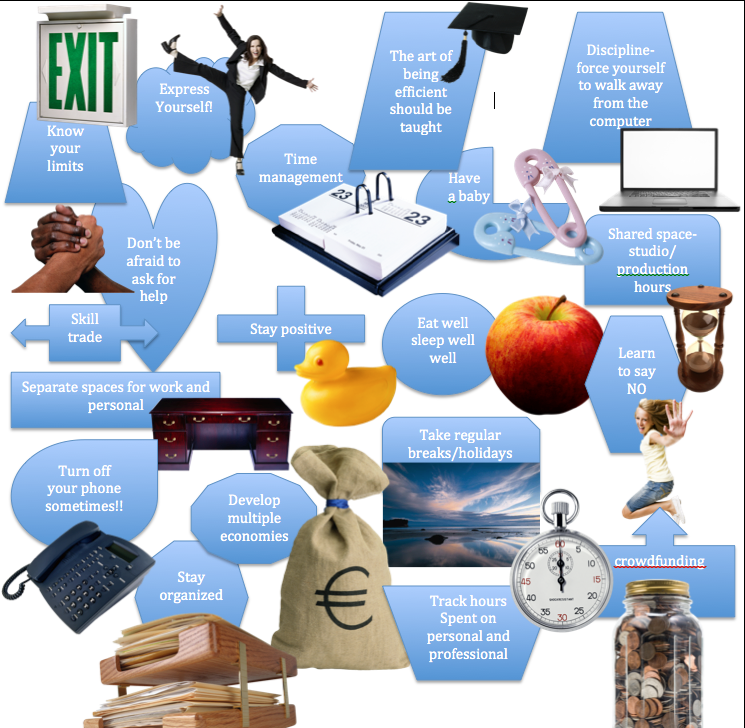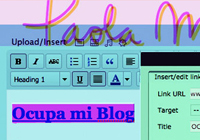Hace poco más de una semana estuve en Cracovia en el segundo encuentro anual del IETM. Como siempre hubo de todo y para todos los gustos. Uno de los momentos más emotivos fue la grabación de un video dirigido a la gente que está ocupando Wall Street estos días. Por primera vez el IETM se posiciona a nivel político. Fue muy emocionante.
En Estocolmo[1] nos reunimos un grupo de freelancers para compartir nuestras experiencias, formas de trabajar, necesidades, deseos, etc. Fue muy interesante tomar conciencia de que hay vida más allá del mail y el skype y ver que existe mucha gente como la que escribe, encerrada en su casa durante horas y horas currando sin parar.
Y esto no mola. Así que en Cracovia nos hemos vuelto a reunir con el objetivo de crear una guía (toolkit) de buenas prácticas para conseguir un equilibrio entre nuestra vida privada y nuestro trabajo, buscar nuevos modelos de financiación en nuestros proyectos y crear una red a la que hemos llamado: The International Cultural Freelancer’s Alliance. (oh, yeah!)
Podéis pensar que estamos como una regadera. No lo voy a discutir. La necesidad de abrir espacios de diálogo, compartir información útil que nos ayude a trabajar y vivir mejor es tan grande, que nos hemos inventado esta historia para poder constituir en un futuro una plataforma de freelancers a nivel internacional (precarios culturales en castellano o como diría el ayuntamiento de Barcelona, EMPRENDEDORES -también a nivel inernacional, obviamente-).
En pocas semanas publicaremos un blog, donde iremos publicando todo tipo de información relativa a los temas que hemos discutido en Cracovia. Aquí tenéis el informe con dichas conclusiones recogidas por las moderadoras del grupo, Brina Stinehelfer & Francesca Romana :
The word freelance comes from travelling missionaries in mediaeval times- warriors with a “freelance” (large sword) who were not tied to the service of a particular king, but would go from castle to castle fighting for who they thought was in the right or whoever paid them the most.
In this working group for freelancers working in the field of cultural management, we wanted to re-introduce the idea of the freelancer as a modern warrior, working project to project, fighting the good fight for whoever we believe in (or sometimes, whoever can pay our wine and bread).
For this, we need to develop tools (because every tool is a weapon if you hold it right). So we used creative brainstorming techniques based on the theory of design thinking to identify our challenges, and create solutions.
Our challenges:
*finding the balance between personal and professional.
*maintaining artistic integrity in our work, while making enough means to survive.
*finding ways to join forces and support each other.
*how to sustain ourselves and our work regardless of ups and downs of public funding.
*staying true to our roles as shapers and shakers of culture.
The concrete solutions we came up with are:
A local network for skill trade. This is the concept of creating a work force larger than ourselves as individuals, by identifying others who have different skills, and setting up a platform for skill/work trade on a project to project basis (such as, trading web design for film editing, etc.).
This could also include creating shared working spaces in a café, or having a different freelancer hosting a work day in their home once a week, for people to work individually in a shared space, to increase productivity through a professional working environment, as well as having others around that you can ask for advice, when needed.
A Timetable for balancing personal, artistic, and professional time. Many freelancers (including the moderators) also have an artistic practice alongside their professional ones as producers/cultural managers, and it is a careful balancing act, to make sure that all parts get the proper amount of time and energy, including time to turn the computer off and relax! This is especially challenging for freelancers that work from home, as many do. The concept here is to create a working timetable, designating specific hours for specific tasks and stick to it, to maintain balance so that you do not get overwhelmed or lose sight of a task.
Guides for alternative business/funding models. This would be a how-to guide for alternative funding- as state funding becomes more and more unreliable, we must find a way to make sure the work continues. This would include online platforms such as crowd funding, finding patrons (individual sponsors to help financially support your work), seeking sponsorship or in-kind donations of goods and services from companies, looking for interns or work force through schools to find people who would be willing to work in exchange for reference/experience (unpaid), and the sharing of materials and equipment (such as a professional quality printer), working space, or employees (such as an accountant) among a collective of freelancers to cut costs.
Chicken Soup for the Freelancer’s Soul. A collection of reminders and encouraging thoughts to help with the all important, yet often overlooked moral support that freelancers need.
“Shut off the phone/computer sometimes- Learn to say no so that you can take a break when you need it!”
“Don’t waste energy on negativity- love yourself!”
“Don’t be secretive- share what you are doing with the world- talk to people, see people- you never know who may become an ally or help in your project.” “Define the rules in your work and stick to them”
“Have a mentor”
“Separate ego and business- bad professional experience doesn’t mean you are a bad person.”
However, the strongest thing that came out of this working group was not a tool, but a call for action- to create a network, platform or even a union to address the particular needs of freelancers- international platform for exchange, collaboration and advocacy.
The large and loud numbers of freelancers in IETM is also perhaps telling about our current constitution of the world of cultural management- more and more people turning towards the freelance way in response to increasing constraints in state supported institutions and larger cuts in funding
We are all very aware of the crisis, and as I see it, there are two ways to react, Esther to fight back against the system, (as the working group for politics so bravely tackled) or to explore alternative working models outside of the system- namely, working independently, freelancing.
So inspired by this meeting, we will set forth on the task of creating a sustainable system/ platform for freelancers, by identifying individuals interested in joining, similar organizations already in place for the support of freelancers, which we could either join forces with or learn from, finding individuals who have experience in starting large networks, to be advisors/ mentors, and dedicated people willing to join the team as part of the organizational committee, as well as technical/web support.
We will continue with this mission, and keep track of our progress through a blog which anyone can join (www.internationalalliance.wordpress.com) until the next meeting in Copenhagen, during which we hope to once again unite forces, and come together to create a mission statement, an official declaration, and launch a sustainable platform for freelancers.
So the question is, how do we start a network, what are the next steps, and who’s with us? If you are interested in joining forces or receiving updates, contact internationalalliance11@gmail.com
Vamos a seguir reuniéndonos en los próximos encuentros. Os animo a que os unáis a esta aventura. Próxima parada: Copenhague. Let’s make history!
[1] http://www.ietm.org/index.lasso?p=information&q=eventdetail&id=459



